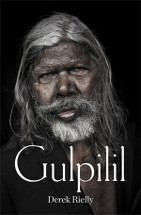Gulpilil by Derek Reilly

MacMillan, 2019. ISBN: 9781760784973.
(Age: 16+) Highly recommended. Non-fiction. This is a beautiful
book. It tells of the life of David Gulpilil, esteemed Aboriginal
actor, dancer and performer, through conversations with Gulpilil
himself, and through the shared memories of the many people who got
to know him - people like Paul Hogan, Jack Thompson, Margaret
Pomeranz, Natasha Wanganeen, and others who have wonderful stories
to tell. Sadly, Gulpilil is now suffering from lung cancer and is
not expected to live much longer; he is being cared for by close
companion and experienced aged care nurse, Mary, in Murray Bridge,
not too far from the treating Adelaide hospital, also near to the
site of one of his earliest films Storm Boy, but very far
from his Yolngu homelands in Arnhem Land in the Northern Territory,
featured in his later films Ten canoes and Charlie's
Country.
Did you know that Gulpilil is a first contact Aboriginal who didn't
see a white man until he was eight? He is a living link with a
culture that is 60,000 years old. Brought up in the traditional way
of life, he first ventured into the 'white' world winning the Darwin
Australia Day Eisteddfod dance competitions a number of times. Then
his charismatic performance in the film Walkabout saw him
set on a career in films. Actors and directors alike describe his
intuitive ability to convey meaning with a look or a stance, a
presence that just feeds the camera. He brought the face of
Aboriginal Australia to film and is remembered for films ranging
from Crocodile Dundee to Rabbit proof fence to The
tracker. His contribution to Australian cinema was recognised
in 2019 with the NAIDOC lifetime achievement award.
However, the difficulty of straddling two worlds has taken its toll,
just as in earlier times it did for Bennelong, feted by Governor
Philip in the late 18th century, and, the more recent, Namatjira,
famous landscape artist of the 20th century. Gulpilil, like them,
has battled with alcohol, and has given away everything he has to
extended community.
Gulpilil's words on winning the NAIDOC award were 'Never forget me.
While I am here, I will never forget you. I will still remember you,
even though I am gone forever, I will still remember.' In that
spirit, Reilly's book makes a fitting tribute to an Australian now
regarded as a national treasure, a man of amazing charisma, much
loved by friends and family and the wider Australian audience. This
is the book he wanted written; it will help us to remember him.
Helen Eddy